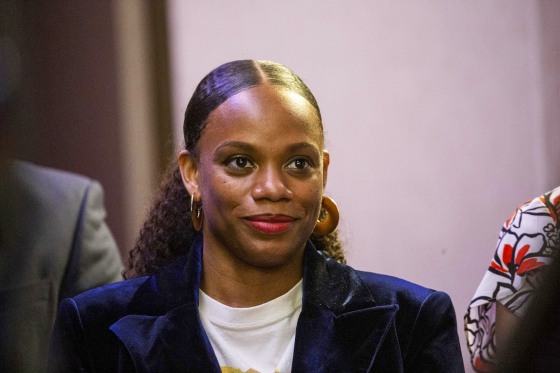WASHINGTON — Progressives are blaming a flood of super PAC money for the disappointing showing of several of their candidates in Tuesday’s primaries, although they remain confident about two races in which NBC News has yet to declare a winner.
In races that tested the mood in the Democratic Party a year and a half into Joe Biden's presidency, the mixed results are not the sweeping victories the left had hoped for when progressives coalesced around a strategy this year that moved away from challenging incumbents in the style of Rep. Alexandria Ocasio-Cortez of New York. Instead, they turned their focus to open races in Democratic-leaning districts, expecting their candidates would face easier paths to Congress.
But candidates backed by national progressive groups flamed out in two North Carolina districts and one in Kentucky on Tuesday, two weeks after Nina Turner, a key figure in the presidential campaigns of Sen. Bernie Sanders, I-Vt., lost her second high-profile congressional bid in Ohio.
Still, Summer Lee, who is backed by Sanders, has a narrow lead in a Pittsburgh-area seat over Steve Irwin. And in Oregon, Jamie McLeod-Skinner is outpacing Blue Dog Democratic Rep. Kurt Schrader, although votes are coming in slowly from Schrader’s home county because of a ballot printing issue.
NBC News has yet to call either race.
Instead of facing entrenched incumbents, however, left-wing candidates faced an unexpected — and they say unprecedented — barrage of attack ads in the closing weeks of the campaigns from pro-Israel and moderate Democratic super PACs.
“Progressives are used to getting outspent. They’re used to winning without having the resources to match dollar for dollar. But there’s a big difference between being outspent 2 to 1 and being outspent 10 to 1,” said Leah Greenberg, a co-founder of the progressive group Indivisible, which did not get involved in most of Tuesday's primaries but criticized the spending deluge.
In North Carolina’s 4th Congressional District, based around Chapel Hill, outside groups spent $3.5 million supporting Valerie Foushee over progressive favorite Nida Allam, who had just $370,000 spent in her behalf, according to the campaign finance tracker OpenSecrets.
In the state’s 1st District, United Democracy Project, a group funded by the American Israel Public Affairs Committee, spent $2.4 million boosting Don Davis, who defeated progressive-backed Erica Smith. Outside groups spent just $650,000 to support Smith’s campaign.
In the race in Kentucky, where longtime Democratic Rep. John Yarmouth decided not to run for re-election after redistricting made the seat significantly redder, outside groups spent more than $1 million supporting winner Morgan McGarvey, while just $1,224 was spent to support Attica Scott, a criminal justice reformer whose campaign had struggled to gain much traction.
"The Democratic Party is going to lose in 2022 and beyond if the establishment remains silent as corporate interests try to throttle dynamic young leaders and prop up those most likely to oppose a popular agenda,” said Stephanie Taylor, a co-founder of the Progressive Change Campaign Committee.
Moderates, however, say the results of the elections speak for themselves — especially because all three lost by wide margins.
“As they did in 2018, 2020 and 2021, Democratic primary voters defied conventional wisdom by rejecting the far left in favor of mainstream candidates,” said Matt Bennett, the executive vice president of the centrist Democratic think tank Third Way. “And once again we learned that Twitter popularity often does not align with the real world.”
The one race in which progressives had more resources than the other side was in Pittsburgh, where Lee, the progressive favorite, has declared victory. NBC News race yet to call the race.
“Despite more than 10 million spent against progressive candidates in tonight’s races, we stand to make significant gains,” said Natalia Salgado, the director of federal affairs for the progressive Working Families Party, which backed Lee.
Still, polls had shown Lee with a large lead not long ago, which seemed to collapse in the final weeks of the race.
The Oregon race featured an unusual dynamic that complicates a simple progressive-vs.-moderate narrative in which much of the local Democratic Party backed progressive challenger McLeod-Skinner over Schrader, arguing Schrader wasn’t a real incumbent because redistricting had shuffled the map so much that a majority of voters in the district were new.
And Schrader, like moderate Democratic Rep. Henry Cuellar of Texas, who faces a runoff next week, has been compared to Sen. Joe Manchin, D-W.Va., for straying far enough from the Democratic mainstream that “he’s kind of gone off the reservation,” as a Democratic operative working to boost other moderate candidates put it, requesting anonymity to speak candidly.
A Schrader loss could have some collateral damage for the White House, however, because he was President Joe Biden's first endorsement in this year’s midterms.

